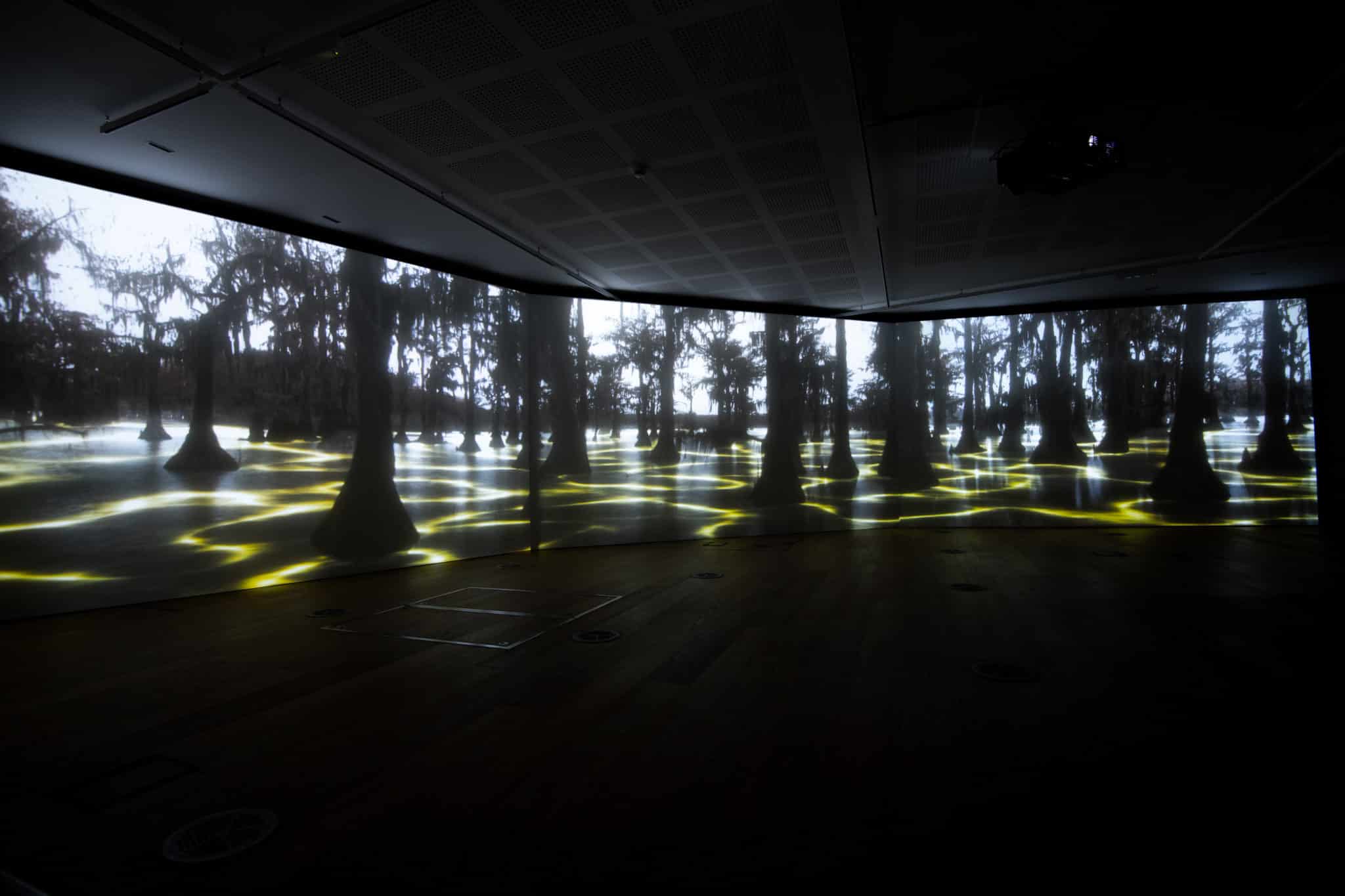The Amelia Scott exhibition space is currently hosting Kelly Richardson’s work, Leviathan.
On until May 15, the Times discovers more about this striking, immersive video installation from the renowned digital artist…
Currently on display at the Amelia Scott exhibition space, which is located in the town’s new cultural hub, is Leviathan, a large-scale triple-screen immersive video installation by the Canadian artist Kelly Richardson.
The show has been able to go ahead thanks to a unique collaboration with the Arts Council Collection, through the ‘Borrow Big!’ scheme. The presentation of Leviathan at The Amelia will be the first time the work has been exhibited since being acquired by the Arts Council Collection in 2015. Leviathan was originally commissioned by Artpace in San Antonio, Texas.
Kelly Richardson crafts video installations and digital prints that offer imaginative glimpses of the future and prompt a careful consideration of the present. Her work is influenced by 19th-century landscape painting, 20th-century cinema, and 21st-century planetary research.
According to a spokesperson at The Amelia the video work ‘draws on the artist’s distinct art practice which pulls together ideas around conservation and a careful observation of the effects of humanity on the planet’.
Richardson films the bald cypress trees, indigenous to Caddo Lake in Uncertain, Texas and manipulates the footage, creating a series of twisting, snake-like tendrils of yellowish light in the water with an eerie soundtrack replacing the sounds of nature.
The artist explains: “I’m trying to create contemplative places which are both beautiful and mesmeric but at the same time unsettling.”
Presented as a triptych, the landscape is viewed from a single vantage point, like a painting set in motion. The immersive environment of Leviathan is entirely devoid of people and invites viewers to ‘insert themselves into the work’ and become its sole protagonist. Richardson’s manipulation of the video suggests several foreboding plot lines: the birth of primordial life, the emergence of a malign aquatic creature or a post-apocalyptic Earth.
The setting of Richardson’s work is that of Caddo Lake which is thought to be the first site in the world for underwater oil drilling and so it plays a significant role in the shaping of current fossil-fuel debates concerning the global climate crisis.
“Tunbridge Wells has strong links to conservation, having enshrined the protection of wild plants, animals, and natural habitats in The Tunbridge Wells Improvement Act of 1889,” explains The Amelia’s spokesperson.
“This ground-breaking legislation ensured the protection and stewardship of the extensive commons found locally and the plants and wildlife that dwell and flourish on it. The staging of Leviathan at The Amelia Scott comes at a significant time historically, in reflection of growing global climate concerns and places Tunbridge Wells once again at the centre of environmental and conservation debates.”
According to the cultural space’s spokesperson, the exhibition of Leviathan at The Amelia Scott allows fruitful conversations with themes in the collection. “Visitors are able to experience contemporary and historic ways of conserving the natural world. Richardson’s explorations, research and collection of video footage in Uncertain, Texas, have parallels with the ambitions of those who collected specimens and data during the Victorian period, and were originally part of the Tunbridge Wells Natural History Society, and now in the collections at The Amelia Scott.”
They add that the themes of Leviathan provide vital and prescient reflection on the effects of humans on the natural world, building upon the work of those who came before her. Leviathan continues a tradition of presenting the natural world to audiences, to educate, enthral and generate discussion around the conservation of the natural world.
Kelly Richardson’s Leviathan video installation is open daily at the Amelia until May 15. Entrance is free. For more information visit: theamelia.co.uk
WHAT IS THE ARTS COUNCIL COLLECTION’S BORROW BIG! SCHEME?
The loan of Leviathan has been made possible by the generous support of the Arts Council Collection’s Borrow Big! scheme. Borrow Big! is a pilot aimed at collaborating with venues to loan large-scale artworks from the Arts Council Collection to share with audiences across the UK and to create opportunities for new audiences to enjoy a range of immersive works of art.
The Arts Council Collection was founded in 1946 and is the most widely circulated national loan collection of modern and contemporary British art, spanning paintings, sculpture, prints, drawings, performance and moving image.
It supports and promotes artists by acquiring art at an early stage in their careers and includes a diverse range of work from artists such as Barbara Hepworth, Henry Moore, Lubaina Himid and Grayson Perry.
With more than 8,000 works and over 1,000 loans made to venues a year, the Arts Council Collection is seen by millions of people in public spaces from galleries and museums to hospitals, libraries, and universities.
The Arts Council Collection is managed by the Southbank Centre on behalf of the Arts Council England.








